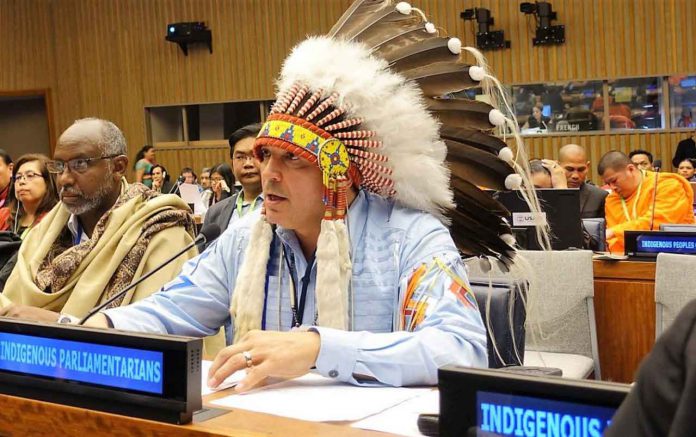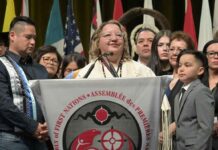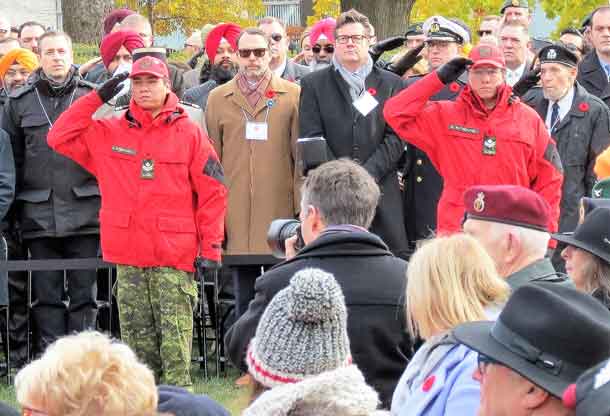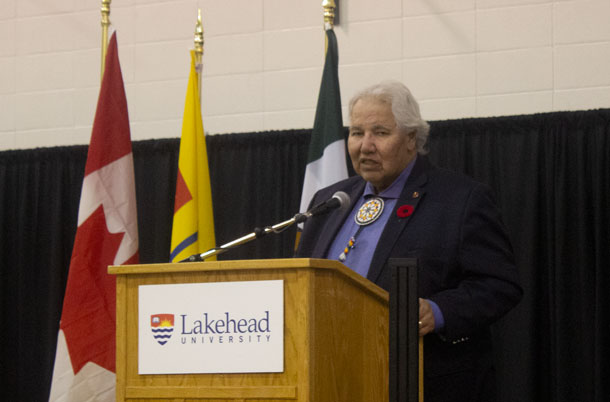NEW YORK – Assembly of First Nations National Chief Perry Bellegarde addressed the United Nations earlier this week.
Here is the text of his speech:
Tawaw kahkiyaw,
okimâwak, nâpewak, iskwewak, kêhtêak, oskâyak. Okimaw piyasiw awasis nitisihkason. Miyo kisikaw anoch.
Your Excellencies, delegates, Elders, Knowledge Keepers, colleagues, sisters and brothers,
I began this morning in my own language, in Nêhiyawêwin or Cree.
I wish to acknowledge the Lenapi people on whose traditional territories we come together today. It is an honour to be here with you on such an important occasion. A lot of good and important work has been done in the past year. And it is simply the beginning. Much more needs to be done.
Our languages connect us through our ceremonies, to lands and waters and to our right to self-determination!
And I know from my sisters and brothers around the world that this is true for all Indigenous peoples.
We want our children to grow up with these rich and beautiful languages.
This is how our languages are passed on. From the mouths of our Knowledge Keepers to the ears of our young people.
I have the deepest gratitude for all those Knowledge Keepers and Ceremony People who spoke Cree to me. I give thanks all of our language champions, all around the world, who continue to teach our young people.
Our young people want this vital connection to their ancestors. They want to carry that connection forward to the generations still to come.
And that is their fundamental human right.
The United Nations Declaration on the Rights of Indigenous Peoples affirms the inherent right of all Indigenous peoples to use, to revitalize, and to pass on to future generations our languages, our writing systems, our literatures and our names for communities, places and persons.
This is not an abstract goal. As the Declaration itself states, the right to language is part of the very foundation of the survival, dignity and well-being of Indigenous peoples worldwide.
We all know that colonialism caused profound harm to the cultures and traditions of Indigenous peoples around the world, and that includes actions to destroy our languages.
UNESCO has estimated that more than half of the surviving Indigenous languages in the world could disappear before the end of this century.
In Canada, generations of our children were taken from their homes and communities because the government did not want them to grow up as First Nations, Inuit or Métis. I know this has happened in many regions of the world.
As part of this deliberate attempt to destroy our rich and diverse cultures, the children who were taken away were forbidden to speak their languages, even beaten and abused for speaking their mother tongues.
That was often the life experience of the very Knowledge Keepers who we now depend on to keep our languages alive.
So you can see that when we speak our languages, and when our young people commit to learning and using our languages, this is nothing less than a heroic victory.
Today, in Canada, there is a very real danger that our Indigenous languages will not survive another century.
For our languages to survive, they must be taught throughout the life of every young person. And they must have the opportunity to use their language in every aspect of daily life. It can’t be an extraordinary thing. It has to be an everyday, ordinary thing.
In Canada today, just 1 in 5 First Nations persons is fluent enough in their language to hold a conversation.
Our Indigenous languages represent who we are as part of the human family. They also embody the rich contributions that Indigenous peoples make to the world because our languages express the wisdom, our worldview, the laws and lives of our ancestors.
Our Indigenous languages embody traditional knowledge of how to live in balance with Mother Earth, knowledge that will be vital to our common survival as we face the ecological challenges ahead of us.
This is the time to come together to ensure the survival of our languages. We can’t afford to wait.
There is reason for hope because we’ve learned from the Elders who preserved this knowledge for us. We’ve learned from the firsthand experience of our community language champions – the extraordinary learners and teachers who do this work every day. Because of them, the numbers of Indigenous language speakers are slowly starting to grow again.
The International Year of Indigenous Languages was an opportunity to raise awareness and share our knowledge on how to best maintain and revitalize our languages.
Over the past few years, the Assembly of First Nations worked with the government of Canada and with our Inuit and Métis sisters and brothers to develop groundbreaking legislation that sets out a clear national commitment to Indigenous language reclamation, revitalization, recovery and maintenance: Bill C-91.
This new legislation is important because of the commitments it makes and because of the foundation that it has built for the future.
The state of Indigenous languages is a national emergency and it has to be treated as such. We need schools to create and implement effective bilingual and immersion education programs beginning with pre-school age children. And we need programs that inspire all of our people to speak our languages, regardless of age, to renew the vibrancy of our communities.
This is true for all Indigenous peoples around the world.
So I say to all the national delegations assembled here today: work with us to help bring Indigenous languages back from the brink of destruction.
The UN Declaration calls on all of us to ensure that the right to language is protected (Article 13.2) and all states to commit the financial and technical assistance necessary to ensure that this right is fulfilled (general provision of Article 39).
Our language Knowledge Keepers, leaders and champions know that needs based funding is essential to supporting the normalization of Indigenous language fluency.
The Strategic Outcome Document of the International Year of Indigenous Languages sets out an agenda to protect and revitalize Indigenous languages around the globe.
And a keystone of this strategy is the commitment to the International Decade of Indigenous Languages.
The International Year was a good start. But one year is simply not enough when we’re talking about diverse cultural heritages, facing such grave threats, after so many decades of suppression and neglect.
The International Decade will be an important symbol of the world’s commitment.
Member States should aim to support the restoration of Indigenous language fluency as a goal for the decade starting immediately.
I know that we can accomplish great things when Indigenous peoples and Member States work together in a spirit of cooperation, peace, justice, and friendship.
Much has been accomplished in the past year. Let’s continue to work together to get this important work done.
Thank you.






